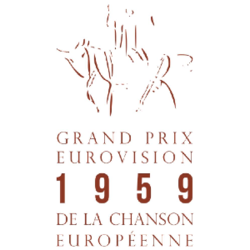
The Eurovision Song Contest 1956 was the first edition of the annual Eurovision Song Contest, organised by the European Broadcasting Union (EBU) and host broadcaster Radio svizzera italiana (RSI) on behalf of the Swiss Broadcasting Corporation. The contest, originally titled the Gran Premio Eurovisione 1956 della Canzone Europea, was held on 24 May 1956 at the Teatro Kursaal in Lugano, Switzerland, and hosted by Swiss television presenter Lohengrin Filipello, which remains the only time that the contest has been hosted by a solo male presenter.

The Eurovision Song Contest 1957 was the second edition of the annual Eurovision Song Contest. Organised by the European Broadcasting Union (EBU) and host broadcaster Hessischer Rundfunk (HR) on behalf of ARD, the contest, originally known as the Grand Prix Eurovision de la Chanson Européenne 1957 was held on Sunday 3 March 1957 and was hosted at the Großer Sendesaal des hessischen Rundfunks in Frankfurt, West Germany by German actress Anaid Iplicjian.
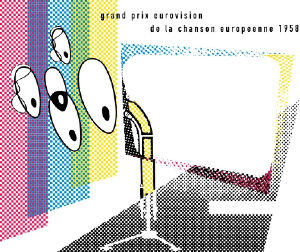
The Eurovision Song Contest 1958 was the third edition of the annual Eurovision Song Contest. Organised by the European Broadcasting Union (EBU) and host broadcaster Nederlandse Televisie Stichting (NTS), the contest, originally known as the Grand Prix Eurovision de la Chanson Européenne 1958 was held on Wednesday 12 March 1958 at the AVRO Studios in Hilversum, the Netherlands and hosted by Dutch television presenter Hannie Lips. This marked the first time that the contest was hosted in the country of the preceding year's winner, a tradition that has been continued ever since.

The Eurovision Song Contest 1960 was the fifth edition of the annual Eurovision Song Contest, held on Tuesday 29 March 1960 at the Royal Festival Hall in London, United Kingdom, and hosted by British television presenter and actress Catherine Boyle. Organised by the European Broadcasting Union (EBU) and host broadcaster the British Broadcasting Corporation (BBC), the United Kingdom was offered the rights to stage the contest after the Netherlands, which had won the 1959 contest, declined the opportunity after having organised the event in 1958.
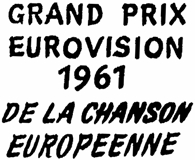
The Eurovision Song Contest 1961 was the 6th edition of the annual Eurovision Song Contest. Once again, the contest was held in the French seaside city of Cannes, having also hosted the 1959 edition. Organised by the European Broadcasting Union (EBU) and host broadcaster Radiodiffusion-Télévision Française (RTF), the contest was again held at the Palais des Festivals et des Congrès on Saturday 18 March 1961, becoming the first contest to take place on a Saturday evening, a tradition that has continued ever since. The show was directed by Marcel Cravenne and again hosted by Jacqueline Joubert, who had also hosted in 1959.
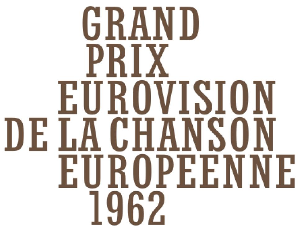
The Eurovision Song Contest 1962 was the 7th edition of the annual Eurovision Song Contest. It took place in Luxembourg City, Luxembourg, following the country's victory at the 1961 contest with the song "Nous les amoureux" by Jean-Claude Pascal. The contest was organised by the European Broadcasting Union (EBU) and host broadcaster Compagnie Luxembourgeoise de Télédiffusion (CLT), and was held at the Villa Louvigny on Sunday 18 March 1962 hosted by the Luxembourgish speaker Mireille Delannoy. This remains the last time that the final of the contest was not held on a Saturday, as since 1963 the final of the contest has consistently been held on a Saturday evening.

The Eurovision Song Contest 1966 was the 11th edition of the annual Eurovision Song Contest. It took place in Luxembourg City, Luxembourg, following the country's victory at the 1965 contest with the song "Poupée de cire, poupée de son" by France Gall. Organised by the European Broadcasting Union (EBU) and host broadcaster Compagnie Luxembourgeoise de Télédiffusion (CLT), the contest was held at the Villa Louvigny on 5 March 1966 and was hosted by Luxembourgish television presenter Josiane Chen.

The Eurovision Song Contest 1984 was the 29th edition of the Eurovision Song Contest, held on 5 May 1984 in the Théâtre Municipal in Luxembourg City, Luxembourg. Organised by the European Broadcasting Union (EBU) and host broadcaster Radio Télévision Luxembourg (RTL), the contest was held in Luxembourg following the country's victory at the 1983 contest with the song "Si la vie est cadeau" by Corinne Hermès. The event was presented by Désirée Nosbusch, who, at 19 years old, remains the youngest person to have hosted the contest as of 2024.
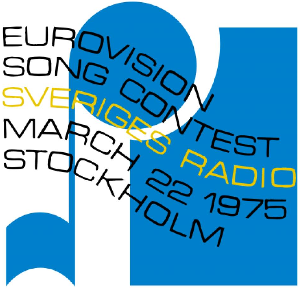
The Eurovision Song Contest 1975 was the 20th edition of the Eurovision Song Contest, held on 22 March 1975 in the Sankt Eriks-Mässan in Stockholm, Sweden. Organised by the European Broadcasting Union (EBU) and host broadcaster Sveriges Radio (SR), and presented by Karin Falck, the contest was held in Sweden following the country's victory at the 1974 contest with the song "Waterloo" by ABBA.
The United Kingdom selected their entry for the Eurovision Song Contest 1996 in Oslo, Norway with a new show, The Great British Song Contest. The winning entry was Gina G with "Ooh Aah... Just a Little Bit".

The Netherlands has participated in the Eurovision Song Contest 64 times since making its debut as one of the seven countries at the first contest in 1956. The country has missed only four contests, twice because the dates coincided with Remembrance of the Dead, and twice because of being relegated due to poor results the previous year. It has missed the final despite qualifying once, in 2024, due to the personal conduct of its entrant which led to disqualification. The current Dutch participant broadcaster in the contest is AVROTROS. The Netherlands has hosted the contest five times: in Hilversum (1958), Amsterdam (1970), The Hague, and Rotterdam (2021).

Germany has officially participated in every Eurovision Song Contest since its inaugural edition in 1956, except in 1996 when its entry did not qualify past the audio-only pre-selection round, and consequently was not seen in the broadcast final and does not count as one of Germany's 67 appearances. No other country has been represented as many times. Along with France, Italy, Spain, and the United Kingdom, Germany is one of the "Big Five" countries that are automatically prequalified for the final, due to their participant broadcasters being the largest financial contributors to the European Broadcasting Union (EBU). The final is broadcast in Germany on ARD's flagship channel, Das Erste.

Luxembourg has participated in the Eurovision Song Contest 38 times since its debut at the first contest in 1956. The current Luxembourgish participant broadcaster in the contest is RTL Lëtzebuerg (RTL). The nation participated in all but one event between 1956 and 1993, only missing the 1959 contest. After finishing among the bottom seven countries in 1993, Luxembourg was relegated and prevented from competing in 1994. The nation declined to return to the contest in 1995, and would make no further appearances over the next three decades. The country returned to the event for the first time in 31 years in 2024.

Monaco has participated in the Eurovision Song Contest 24 times since its debut in 1959. The country's only win in the contest came in 1971, with "Un banc, un arbre, une rue" performed by Séverine. As a result, Monaco was expected to host the contest in 1972, but it ultimately declined. The Monégasque participant broadcaster in the contest was Télé Monte-Carlo (TMC). Monaco is the only microstate to have won the contest to date.

The United Kingdom has participated in the Eurovision Song Contest 66 times. Its first participation was at the second contest, in 1957, and it has entered every year since 1959. The British participant broadcaster in the contest is the British Broadcasting Corporation (BBC). The country has won the contest five times: in 1967, with "Puppet on a String" performed by Sandie Shaw; in 1969, with "Boom Bang-a-Bang" by Lulu ; in 1976, with "Save Your Kisses for Me" by Brotherhood of Man; in 1981, with "Making Your Mind Up" by Bucks Fizz; and in 1997, with "Love Shine a Light" by Katrina and the Waves. The UK has also achieved a record sixteen second-place finishes, the first in 1959 and the most recent in 2022.
Portugal was represented at the Eurovision Song Contest 1996 with the song "O meu coração não tem cor" composed by Pedro Osório, with lyrics by José Fanha, and performed by Lúcia Moniz. The Portuguese participating broadcaster Radiotelevisão Portuguesa (RTP) organised the national final Festival RTP da Canção 1996 in order to select its entry for the 1996 contest in Oslo, Norway. The competition took place on 7 March 1996 where "O meu coração não tem cor" performed by Lúcia Moniz emerged as the winner following the votes from ten regional juries.
Belgium debuted in the Eurovision Song Contest 1956, held on 24 May 1956 at the Teatro Cursaal in Lugano, Switzerland. The Walloon broadcaster INR organised a national final to determine two Belgian entries for the contest. Held on 15 April 1956, the event saw ten songs compete to be the Belgian entries; the results were determined by the jury panel and postcard voting. The songs "Messieurs les noyés de la Seine" by Fud Leclerc and "Le plus beau jour de ma vie" by Mony Marc were selected to represent the nation. Belgian entries performed 3rd and 10th, respectively, out of the 14 entries competing in the contest.
The Netherlands participated in the Eurovision Song Contest 1996 with the song "De eerste keer" written by Piet Souer and Peter van Asten. The song was performed by Maxine and Franklin Brown. The Dutch broadcaster Nederlandse Omroep Stichting (NOS) returned to the Eurovision Song Contest after a one-year absence following their relegation in 1995 as one of the bottom six countries in the 1994 contest. NOS organised the national final Nationaal Songfestival 1996 in order to select the Dutch entry for the 1996 contest in Oslo, Norway. Five acts competed in the national final which consisted of six shows: five semi-finals and a final. Five entries qualified from to compete in the final on 3 March 1996 where "De eerste keer" performed by Maxine and Franklin Brown was selected as the winner following the votes from 13 regional juries.
